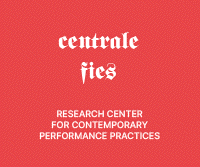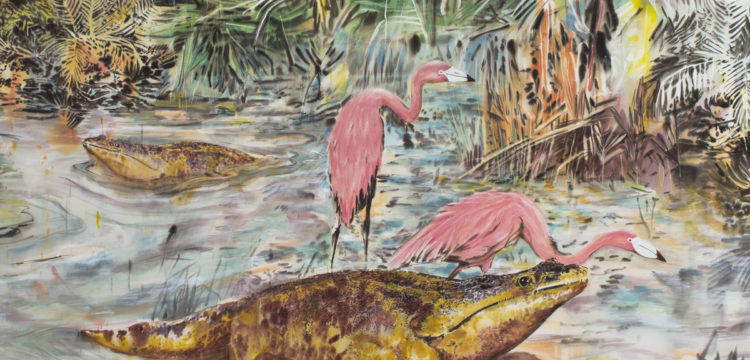We All Need to Get Out of Here
Howie Lee, Genome 6.66 Mbp & co: a leap into Chinese electronic scene
It was always a very bad time in Arkham…
H.P. Lovecraft’s haunted city was never precisely located on this planet, but its imagery soaked with legends, witch hunt and a mental asylum materialized in the shape of a club in Xuhui in Shanghai, a booming area which was formerly part of the French Concession. These concessions were areas in China, Hong Kong and Macau, where foreign governments could exercise power and most of them enjoyed extraterritoriality. In plain terms, a form of colonialism.
My eyes were wide open for signs of historical weight. No surprises, I exulted when I had the chance to go to Arkham club for the launch of a new label called Silk Road Sounds—so many threads to develop from this name—out of this event organized by YETI OUT, a club promoter putting up parties in Shanghai, Hong Kong and London. They stress how “creative tribes from the East and West continue to intertwine both online and offline” and in January 2018 they released the first volume of a compilation series which includes “varied odes of Eurasia,” from Turkey to Japan, to Vietnam and obviously China itself.
Delf’s live set brought us to Hong Kong and had a strong visual impact. Images were vivid and conceptual, with references to themes such as time, work, and urban landscape. Although the genre references of the night were evident, a grimey hip hop and its branchings crossed all the sets, it was pretty powerful to find one of the resident djs playing in this Chinese club, backed by projections of American black rappers. It is not as obvious as it could appear, and this shared global set of visual references is pushed by the culturally curious and globally aspirational post-90s generation, which mainly make the crowd in this club. Chinese millennials, young people who were born in the 80s and 90s, have a population of around 415 million, roughly 30% of China’s total population, which is also 90 millions more than the entire population of the US. The world’s view they have is going to influence the shape of the future, through their choices as consumers, as they don’t have the option to take choices in politics.
It is important to make the effort to understand China, at least because the figures declare that Chinese people’s preferences will have implications for everybody. With this scenery in mind, there is a form of intellectual craftiness which is needed while taking a leap into little known worlds, because the human mind tends to activate several cognitive bias and take on reassuring mechanisms which would like to imply that our schemes of understanding are reliable even in front of different conditions. The size of China, in terms of geographical extension, population, background history and economic power contributes to surround it with the allure of an anonymous and kowtowing mass, often considered undecipherable, like its language. This illegibility provokes more than often a polarization in opinions about China.
But is China this indistinct?
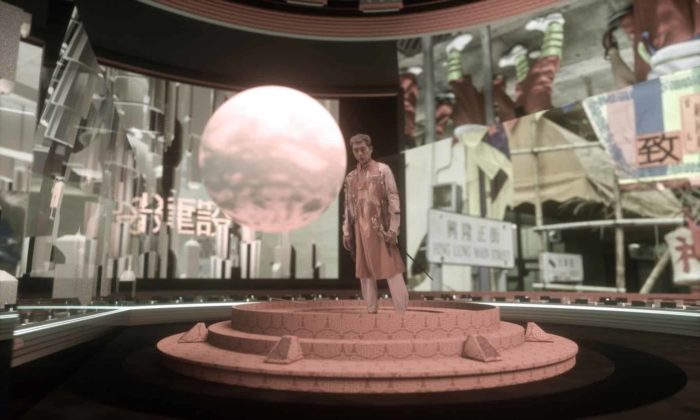
Howie Lee, Four Seas, 2017
In any interpretative effort one can not overlook the fact that the humiliation suffered by China, heavily colonized by Western powers in the nineteenth century, has an inescapable legacy on China’s attitude today. If the Silk Road is an evocative branding for a cultural endeavour, it also leads our gaze toward the massive plan to “embrace a brighter future” conceived and made public in 2013 by the Chinese President Xi Jinping. The project will cost an estimated US$4–8 trillion and consists in infrastructures and trade links to better connect Southeast Asia, Central Asia, the Middle East, Europe and Africa. By land, by sea and in the space, with an extra-terrestrial side which is gaining weight as the production costs of satellites decrease and the technological capacity increases its outreach, potentially providing “a backdoor into the internet systems of countries using these satellites.”
China raises aversion in many people with libertarian values and a blind excitement in many others. We already got it dangerously wrong. In the Sixties, many European communist intellectuals espoused Maoism because their need for alternatives—which we share as we are looking for alternatives—made them tripping and assuming a selective gaze. Edoardo Sanguineti, one of the founder of Gruppo 63, an avant-garde Italian literary movement, remembered «I fell in love with Maoism, it represented the hope of a non bureaucratic socialism, not tyrant, dynamic, and it appeared as the only alternative for those who had little sympathy for capitalism and strong doubts about the Soviet Union. Mao was a good reference point for those who wanted to change the world, starting from the most impoverished areas, as China was, and which had become the legendary place of equality and justice». Natalia Aspesi, feminist writer now in her late 80s, recalls how in the Seventies the leftist bourgeoisie was attending l’Opera at La Scala in Milano wearing Maoist-collar shirts. The wording “cultural appropriation” had not been coined yet.
When I decided to embark into this journey through clubs and music producers, I wanted to fill the space between these extreme poles and get a sense of reality, of real thrill and real fear. I wanted to feel the social and political fabric by digging into real people accounts. I wanted to challenge preconceptions and embrace a level of analysis which doesn’t stick to oppositions: I was looking for material for descriptions.
We need to break the stereotype in every direction: China is stimulating and exciting, walking in the streets of Shanghai is an infusion of energy; China is also scary and disturbing, experiencing the limitation of freedom of expression can support the worst nihilistic view of the human society.
Today, we have several tools to avoid a judgemental approach and leave behind a mental comfort-zone: we read Said and we know how to use the term Orientalism in a sentence, we read Fanon and we know the essential role of struggle, we are hungry for new ideas, such as those developed in the academic world bridging Asia and Africa in search of “challenges and possibilities of cross-continental and trans-regional encounters.”
We have the urgency, a neon-lighted awareness, to enjoy the opportunities offered by a connected underground and in my opinion this line is recognizeable in music too. Inevitable to look at Fatima Al Qadiri, who produced her 2014 Asiatisch, a hyperbolic album which supports the dismantlement of clichés by putting them on stage in a way which is extreme for its evidence. Asiatisch identifies the problem in a univocal and simple way: transcultural art collaboration is a minefield. Inhabiting it and acting in it is a way to push it forward.
It all started with Shanzhai Biennial, a collective formed by stylist Avena Gallagher along with artists Babak Radboy and Cyril Duval, which acts as a meta-brand and plays with the Chinese mode of knockoff production. When put in relation to technological devices, their practice also evokes an open-source countercultural ethos. On the occasion of the group show ProBio at New York’s MoMA PS1, they asked Fatima Al Qadiri to produce “cheap, Chinese instrumental,” for a Chinese version of Sinead O’Connor’s Nothing Compares 2 U. As she told Vice “I did something completely against their instructions, and they didn’t use it. That’s what made me want to make this record; exploring this notion of Asian musical motifs in Western music. This idea that the West has been stringing together a very intricate tapestry of stereotypes regarding China.”
Shanzhai Biennial went on with its project and presented “Shanzhai Biennal no. 2”, with actress Wu Ting Ting wearing a sheath dress which reproduces the graphics of the Head and Shoulders shampoo bottle (and, no doubt, the name of the brand is misspelled as head & shouldars) and lip-syncing to a mangled Mandarin version of the incomparable heart wrenching hit from 1990. Fatima Al Qadiri also went on with her project and released the track, titled Shanzhai (for Shanzhai Biennial) with the leading singing by Helen Feng, key figure in the Chinese music scene since she moved from Los Angeles to Beijing in 2002 and founded the rock band Nova Heart.
The story behind this track and the fake stories written afterward (the lyrics in Mandarin are not really making sense, although they are the literal translation of the original lyrics), delivers this idea of an Imagined China, “not just a collection of dislocated stereotypes, it is an environment, a value system, a very rich and disturbing narrative” Fatima Al Qadiri explains. This global culture is based on meanings arising precisely from jumps back and forth between different cultural frames, and sometimes they are literally reflected images.

Howie Lee, Four Seas, 2017
The Chinese youth is facing epochal changes in the economic and social structure of their country, which are reflected on the most intimate structures of their lives, such as family life and personal aspirations. The challenge lies not only in deconstructing tradition and constructing a new one, but in the fact that changes occur at such speed that there is no time to decipher them and have generations understand each other. In China it is said that a generation lasts 5 years, after which the vision of the world and the scale of values changes. Aristophanes (Pan Wei-ju) is a singer and mc from Taiwan. She collaborated with Grimes on her track Scream and Grimes produced 人為機器 (HUMANS BECOME MACHINES). “I have been really longing to escape from my family for years. I need to build my own life. I don’t know if this is a problem with Western families, but it is a big problem for Asian families.” she says in an interview with the Young Post. Her family doesn’t know about her career in music, they think she works as a school teacher. In many conversations I had during my time in China, it seems like compromising is the most manageable strategy to keep on with these present times.
HOWIE LEE, DO HITS, BEIJING
The foundations of the Forbidden City spread over 180 acres in Beijing. Power, solidity, history, prestige pervade the brightly coloured buildings, the open spaces with delicate needle-shaped evergreens, the corridors between red walls. Chinese history is indeed a tornado of exaltation. I feel lucky to be here. I text Howie Lee while roaming around and he tells me he has some time to meet me today. I get into a taxi. Traffic is intense to reach Wagas, a restaurant in the fancy neighbourhood of Salintun. “You’re lucky to find me in Beijing, I moved out of the city.” I can’t agree more, and again I feel lucky today. Howie is confident, ambitious, straightforward, sharp. It’s a pleasure to chat with him, as one of the most established local producers. He was playing at the very first ever Boiler Room in China, in April 2016, and at the Douban Festival, in May 2017, he shared the stage with Alessandro Cortini, Andy Stott, Actress, to name some of the international highlights which were featured in possibly the only festival of this quality in the entire country. Only one edition so far, as apparently the crowd is still too small for this kind of line-up.
Howie Lee is the founder of Do Hits, a label that released compilations and organised parties in Beijing between 2011 and 2017, starting at the punk club School Bar and then moving on to Dada. Today it’s over, “I had a lot of fun, but now I feel club music is not for me anymore. At the time I wanted to play with people, I was coming from a rock background and when I started doing electronics I found myself without a stage. That’s why I started the parties. Now I feel people already know what I’m going to play and I’m not interested in simply entertaining them, I’m not a kid anymore.”
After a year spent in private, Howie Lee came back with a new EP, Natural Disaster. Many changes occurred in his life, he moved back from Taipei—where he stayed on & off for a couple of years—to the outskirts of Beijing with Veeeky, his wife, taiwanese vj and collaborator.
Disasters are part of the natural landscape of life, and Howie’s attitude seems to suggest that a simple pragmatic answer is to deal with them.
In this EP, Howie Lee has created a continuum between ancient atmospheres, built by instruments with a sound that emerge from the dawning of human history, and a blend of distorted voices and rythmic variations that evoke a world in progress. He tells me that it came as a natural thing to listen more and more to psychedelic music from the past, Middle-Eastern sounds, American jazz from the 60s like Don Cherry. He also spent words to praise the Indian music tradition. He had the chance to travel there thanks to the invitation of Magnetic Fields festival in Rajasthan.
第一场雨 (The first rain) is the fifth track of the EP, and it was released accompanied by a visionary and evocative video of human beings of indefinite gender floating in a matrix.
The first rain
I came from heaven
And I brought you back to the men
Continuing on the path of the ancestors
The things of heaven
Aren’t something traceable among men
Ah, being obsessed with the truth
It is totally useless.
Ah, although the field has been plowed for a long time, it’s become finally sterile
This rain soothes every pain,
Living as being drunk and dying as dreaming / Living as in trance?
What strikes me the most about China, as for many other Asian countries, is the pace of change and its impact on the perception of reality. When your economic condition and access to increasingly sophisticated technological tools face such a fast metamorphosis, it is more instinctive to develop the visionary ability to build realistic scenarios for the immediate future. Futuristic and realistic scenarios. “We live in virtuality, we shouldn’t talk about it as if it was an other dimension. I’m real, but I’m also fake. Whenever I’m on-line, when I read my interviews, I feel a kind of dismay. I read these words coming out of my mouth and it’s not me anymore. Howie Lee is my name you can find online, and I don’t belong to that name. I feel misrepresented because when my words become digitalized in an online interview I become a percentage. I’m fine with it, I know it’s part of the process, but there’s always something missing in interviews and it’s something out of my control. All I can do is to be as true as possible to myself. I have a separated identity when I’m walking in the streets. It’s about how you manipulate things in the digital world, and if you look at the Chinese Internet you will find out how fake is controlling everyone’s mind. The more I’m on the Internet the more I’m fake. Each of us is looking for its ideal world and its ideal representation of things.”

Howie Lee, Four Seas, 2017
After the EP, on June 9th Howie Lee released the single track 下面给你吃啊 (Here’s what you eat), a grinning and ironic display of Chinese contemporaneity.
What a smell!
are you stupid !?
you stink in the armpits
don’t stay close!
you stink
don’t stay close!
you get my branded clothes dirty
I do not want to take the bus
are you stupid !?
everyone, you stink
do not touch me
today my driver seems sexier than usual
today my driver sees himself richer
I’d like to help him to do some sex
but I can not
he is too poor
I can not have sex with him
He is poor
I’m a young lady instead
I am rich
I live in Shanghai
in that famous street full of brand shops
brand name? / brand name? / brand name?
I want to eat his cock
have you seen me down under?
I’ll give it to you as a meal
I’ve never seen it before
do you want to see it?
are you hungry?
do you want to eat it?
Devouring capitalism. “I’m just trying not to buy anything. I’m more digital, I think it’s more environmental friendly and less fetish. You know, all the plastic bullshit around the world one day is going to be shipped to China and invade this farmland…”
The economic growth China experienced since the late 80s created many opportunities in the creative field. “I really appreciate that I was born in China doing music. I have choices. The money problem is not having too little money, but where this money is coming from. I question myself a lot about not making random money, and connections about where the money is coming from.”
“I’m Chinese, I know my future will be good. I know I will have a better life. I’m more and more confident in what I do. Be aware, I see the problems, in fact I see the fake everywhere and I’m very judgmental, but I don’t think I can approach the problems directly, that’s the reality of things. In China you can’t be loud. You can say your things, just don’t say them too loud. I’m very political, I love to argue and no one can really win me, but I don’t want to bring trouble, so often I avoid it and I just do my own things. I think restrictions promote creativity. They say you can’t do rock music? Fine, I’ll do something else. It doesn’t really affect me.”
Limitations to freedom of expression in China are pressing; reports and facts confirm this everyday. Many Internet services we consider fundamental for our emotional and professional life are forbidden (google, whatsapp, facebook, soundcloud, spotify, etc.). All this doesn’t mean that freedom doesn’t exist. On the contrary, freedom finds its way differently, and the way artists in China find a way to create is the core of that energy and ability to tell stories and give a sound to the world.
Howie Lee, Bei Hai, 2015
Howie Lee’s vision is rich. He graduated at the Communication University of China (CUC), one of the best universities in the country. All professionals setting up the CCTV’s Spring Gala festival, the world’s most-watched show, with an estimated audience of 700,000, come from the same University. He studied audio engineering in a class of 30. “The electronic and experimental music scene is mainly for the elite at the moment in China. What I learned by studying also in the West is to dig in the ghetto, to get out of my bubble. I found out how very interesting stuff can come out from the simplest skills. Not the classical kind of academic stuff. When I started to check for music on Taobao, I figured out there’s a huge population, even in the countryside of China, who’s starting to think things in the electronic way.”
On Do Hit’s bandcamp you could read: “What is our own sound? We are not in Atlanta or East London, but what kind of groove can we generate in this cultural environment, and in this time? This is the question of all the Chinese musicians.”
Howie Lee is considered very Chinese because of his research in the less-central areas of China, such as Xinjiang, and because of the traditional instruments he uses in his tracks, being them played with the physical instrument (a sanxian, which is his main plug instrument, a yangqin and a rawap) or with Garage Band, that has one of the best selection of Chinese instruments. “A Japanese producer told me he was ecstatic in front of our Chinese identity, because we do our own things, while in Japan they struggle to prove to Americans that they are like them. But I think we’re all the same, we also want to prove that we’re fine and we have stories to tell to the Americans. And I know the music market is there, but the only way to get into it is to make up a story they’re interested to know, and the story is that ‘We’re different.’ I mean, we are actually different, we have this world that you don’t have. The only real risk is a misinterpretation of this approach in a nationalistic key. I’m looking into my roots because my culture has been highly influenced by the West… in a way you can say it was ruined, but the point is to follow a natural process of reappropriation of our roots. And then I’ll have a story the West will be interested to pick up.”
Without actions of rupture, he is creating the conditions to change things in a way that I would call idealistic. “I want to liberate people with music. It’s so cheap to do music. Everyone can do it. More important than releasing my own stuff is challenging people to do music, I consider this to be my goal. I’m always so surprised at how much people are afraid of music. Just recently I was home with my family and my nephew was playing on my iPad. Her father said: ‘Hey, you’re a girl, you can’t properly play the drums.’ And I was ‘What!? Tell me the reason. There’s no reason.’ In China people judge me for this way of looking at things. People here’ even question if they can properly dance, but ‘Hey! This is my body, that’s your body. If we move, it’s dancing, everyone can dance.’ Changing this attitude, this deep rooted fear, is what I want to do, more than a great album.”
As part of this mission, he translated for an academic publisher Dance music manual, a detailed work which goes into music production and history and it is recommended at University. His search for talents with Do Hits was also part of the plan. “We have a plant that needs to grow.”
At that time, history of music was meaningless. Nobody cared about what was new and what was old because everything was new. Nirvana could have produced their albums after the Portishead’s and before the Velvet Underground, for example.
Getting into music wasn’t easy for him and his peer either. Censorship was heavy and sources were scarce. “My main exposure to music as a child was to my grandfather’s music, a kind of taoist music. I didn’t realize what it was, but I felt it was God music, heavenly. Then also the communist music and the Spring Gala Festival music on tv. But I got wittingly into music only when I was 13 and I discovered Western music through pirated cds.”
They came from excess stock and deleted titles from western and Japanese majors attempting to avoid taxation and disposal cost. To avoid that the CDs were put back into the market, they were punctured one by one and they arrived in China with a hole. No problem for the hungry Chinese listeners, that discovered the albums with some missing pieces.
“I was listening to bands like Nirvana, Linkin Park and American rock. That was easy to understand but other stuff was a complete mystery to me. I remember I was listening to a lot of 4AD stuff and I had absolutely no idea about what I was listening to. I had very little music, so I had to listen to all of that, over and over. Once, I was around 15, I went to the record shop and I asked for electronic music. They gave me Portishead, which is, you know, so depressing. I didn’t even know what depressing mean at the time, you know? I was just listening to it and saying: this is bullshit. This isn’t at all what I want.”
At that time, history of music was meaningless. Nobody cared about what was new and what was old because everything was new. Nirvana could have produced their albums after the Portishead’s and before the Velvet Underground, for example.
“Around 15 I discovered fruityloops thanks to an online community called people’s music. It was probably Taiwanese, and people uploaded music on this platform, but my Internet connection was so slow back then. My parents are both in the army and I was living in a military complex, where the connection was very limited, like 300 MB for a month. Uploading was a nightmare.”
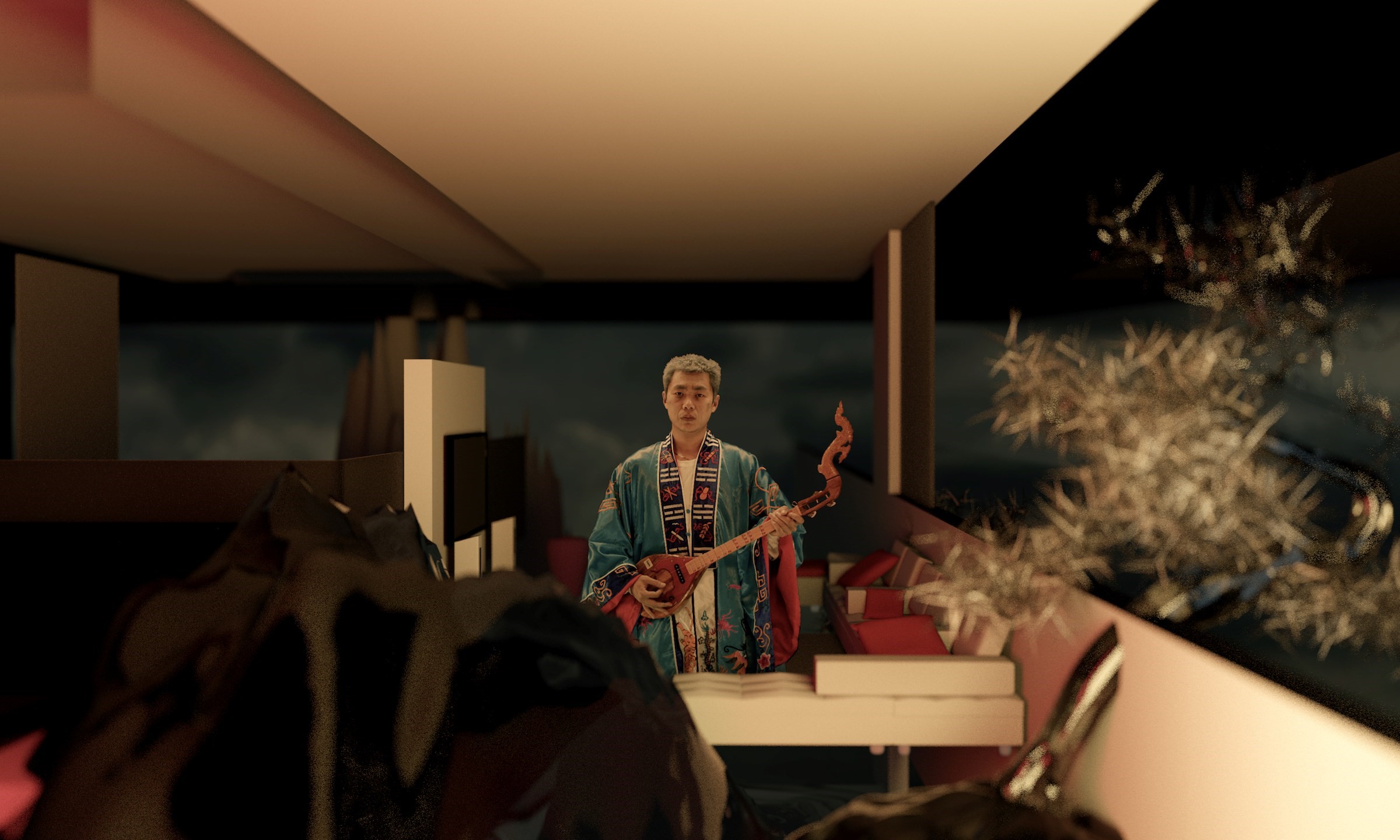
Howie Lee, Four Seas, 2017
“There was a legendary radio, it had no ads, they were playing entire albums of artists like Moby, Air, a lot of western electronic stuff. It was a very sneaky frequency, once we found it out we just recorded everything! I recently read an article about it. It was run by two guys who had a connection with the government through whom they got this frequency. It was a self-funded project, it lasted only a few years around 2002 and then it was shut down. Another source was 通俗歌曲, a magazine funded by the government. It closed down a few months ago because nobody buys paper today. It featured interviews, album reviews and a cd with the newest Western and Chinese songs.”
Booking agency: Scorched Asia
TAVI LEE & SHIYONG OF GENOME 6.66Mbp
In the last Genomix for Radar Radio, before it shut down, the listener is welcomed by a voice generator, kind of an avatar for Tavi Lee, the commander of a spaceship built in 23 years of life started from Chifeng, where she was born in 1994 on the outskirts of the empire, in the northern and remote Inner Mongolia.
Genome 6.66Mbp evokes a universe of mutant shapes, AI, videogames, digital molasses pouring on UK Garage becoming sharp HD tunes for a different human existence.
Tavi left her hometown of four million inhabitants in 2016. Driven by the attitude of a restless digger, she started her descent beyond the plateaux which surround the capital. First stop: Beijing. She didn’t stay longer than a month. The city where the power sits could not be her final destination.
It was summertime when Tavi arrived in Shanghai, where she lives now, and maybe the megalopolis of 24 million people isn’t the culmination of her journey either.
Together with Kilo, a local Shanghainese, they founded Genome 6.66Mbp, one of the most identifiable music organization in the contemporary Chinese electronic scene, and one that got rare international resonance. Identifiable but not easy to label: “It’s not techno, it’s not grime. We release an eclectic mix of sounds, from pop to industrial through dissonance and we dig all over the world. You can’t really define what we do and this is the most important thing for us.”

Genome Compilation, Vol. 2, Self-Salvation (2018). Cover art by Tavi Lee. Courtesy the artists and Genome 6.66Mbp, Shanghai.
Escape from definitions is a way of evading control and even a strategic advantage in a monitored country, and this broad-ranging selection maintains the audience small. Acting as a record label which works as a collector of sounds, more than a producer, in their mixes (with titles of the like Khemist, NAAAH, Shackup, Damacha etc.) and parties you can listen to Oneohtrix Point Never, Haruomi Hosono, Iannis Xenakis and more underground producers such as Organ Tapes, xin, Matteo Vallicelli. “Tavi spends her time browsing Soundcloud, listening to tracks and discovering profiles which have very few followers. Tiny audience, weird sounds.” Shiyong is the third member of Genome 6.66Mbp, and he gives me his perspective while enabling my conversation with Tavi, as I don’t speak Chinese. He is bilingual, he was born and raised in Singapore and met Tavi on Soundcloud. He decided to move to China where he now works as a translator for a videogame company. “In general, around 150 people come to our parties. We had few larger parties where we got around 300 people, but quite often people don’t know what the event is about, they come for the party.” I can’t avoid calculating that out of 24 million people living in Shanghai, we’re referring to a crowd that consists of the 0,0006%. It goes up to 0,006% if we imagine 1500 people is the turnover on a longer time frame. Figures in China are impressive, in every sense.
“Without Tavi there wouldn’t be any of this music in China. Before at the parties there was the old standard stuff, now the genre is indefinable.”
I’m touched by Tavi and I look at her in bewilderment and fascination. I am stunned by the power of her existence, among 7 billion people on earth, among 1 billion and 300 million people in China. Genome is an experience of fracture in China and the limits to mobility and access to the rest of the world can be consuming. For Chinese passport holders it is not easy to travel abroad. Also, China is an unpredictable landscape even for locals. Laws change all of the time, the government has the power to do so and this lack of predictability is besetting.
She does not touch any food while her husband Shiyong and I devour three portions of 18 dumplings and a soup made of blood from chopped duck.
When the time to pay comes, I have to dare once again and see my counterpart’s jaw drops when I open my leather wallet to pull out cash and cards. This visit from the Middle Ages throw people for a loop; after all, also beggars collect payments through QR code. In China you pay with WeChat, the integrated smartphone system for every human need. As I registered in Italy, I’m not allowed to use the wallet function and to pay with the QRcode. It feels as coming from another era, where everyday routine actions have separate gestures. Paper money to pay, business cards to exchange contacts, different applications to research different contents, find places on a map, several apps to chat depending on the link that binds us to one another (we thoroughly distribute friends, new friends, acquaintances, family, grandparents, freaks and lovers on WhatsApp, Messenger, Telegram, Sms to name the basics), one or more apps for emails, different apps to follow posts with a variable engagement (Instagram, Facebook), different apps for different music (youtube, mixcloud, soundcloud, spotify, bandcamp), the original telephone function. Some people still use the landline phone. WeChat summarizes your needs in a single app, but maybe not all of your differentiated needs are met, although everything about you is there. Your movements, your shopping. How to keep a sphere of independence, where to hide your intimacy, if this means renouncing to an incredible convenience? Here we meet the dilemma of how to dismantle a capitalistic system that allowed a greater quality of life. WeChat’s development “has been subsidized by the government since its creation in 2011, and it’s an accepted reality that officials censor and monitor users… and an initiative is underway to integrate WeChat with China’s electronic ID system.” reports The Verge. With over one billion monthly active users and the potential that a successful Chinese product succeeds in the conquest of the world, I take note that the subject deserves further study.
After dinner, we move to a bar and slowly, beer after beer, with the support of some báijiǔ, I try to get more info about their references and the conversation becomes political. Genome shares a common attitude with other labels such as NON, Halcyon Veil, Bala Club, all of them characterized by a mixture of genres, rhythms, speed, diverse geographical connections and musical traditions scattered across the planet. First ally, the Internet. In China, it’s not immediate like in the West to access the free Internet, a VPN is needed, which is a paid service not everybody can afford. “I believe in a world without money. The moment you have money you have inequality.”
“The ideal world would simply be a world where people don’t need to work unless they want to. People need to stop working for money. I would do Genome anyway, and many other things I do, if we were not in a capitalistic system. Capitalism is most compatible with totalitarianism than with democracy, that’s why it’s working so well in China. I think a lot of people agree in saying that capitalism, rather than maximising their productivity, limits it to certain things which are not even useful. The question is to end capitalism. As a person living in China I’m completely pessimistic.”
Tavi is palpably kept away from our exchange. She focuses instead on online videogames. Playing games with common Chinese people is a reaction to the boredom and the lack of interest in the music and fashion scene, they comment. “We need to get out of here” Shiyong says. And he tells me about his desire of being able to code to make video games “because they are a good medium. There are some games, very intense, that have been very relevant in my life, such as Breath of Fire, Dragon Quarter, Ico, Undertale. There’s almost a class analysis in there. Some games have the same value of poetry, they can give you a different experience of language. They can be helpful in understanding what it means to be human, but not in a humanistic way.”
I felt this need and desire, and gratefulness because they shared their secret passages to climb the roofs of the city, we sneaked into a building like ants crawling up the walls while the apocalypse is underway.
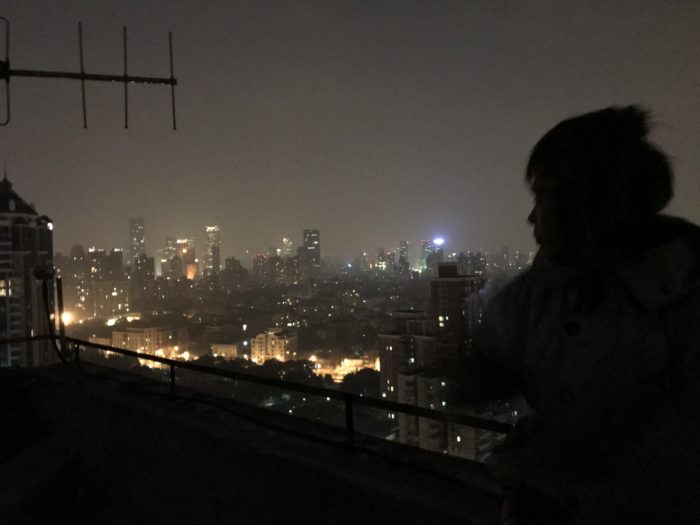
Tavi (Genome 6.66 Mbp) on the roof
I felt good on that rooftop. Looking at Shanghai from atop, observing its capitalistic soul lit up by electricity, together with Tavi and Shiyong made me feel relieved. Their post-apocalyptic imagery represents to me the need for radical choices, in terms of music preferences and aesthetics; it shows the instinct for a desperate research, it captures a gaze relentlessly looking far and beyond.
I will meet again Tavi and Shiyong at Club ALL in the weekend. It was opened one year ago, after the historical Shelter shut down. Everybody has some nostalgia for the Shelter, it was the real place of the underground, literally underground, where Genome were born and where this crowd of explorers met in the first place. ALL is on the first floor. Energy flows.
After the audiovisual live set by Zaliva-D and a trance dj set by Tzusing, it’s time to say goodbye. There is some deep feeling in the air, maybe it is the early hours. I give a hug to Tavi, “We all need to get out of here” sounds like a promise.
A heartfelt thanks to Ma Kexin 马 可心 and Martina Renata Prosperi for translating Howie Lee’s lyrics from Chinese.




